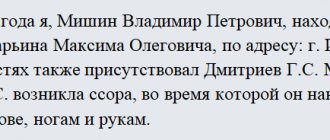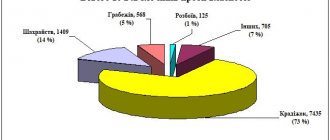Criminal cases of public prosecution
Criminal cases of public prosecution are characterized by great public danger, therefore, in order to initiate a criminal case of public prosecution, it is possible to do without a statement from the victim. The reasons for initiating a criminal case of public prosecution are:
1) statement of a crime;
2) surrender (voluntary reporting by a person about the crime he has committed);
3) a message about a crime committed or being prepared, received from other sources (for example, data obtained as a result of operational investigative activities);
4) the prosecutor’s decision to forward the relevant materials to the preliminary investigation body to resolve the issue of criminal prosecution.
It is worth noting that only persons with special knowledge and employees of government agencies can initiate and conduct criminal cases of public prosecution, in particular:
1) the body of inquiry;
2) investigator;
3) head of the investigative body;
4) investigator.
Another feature of the proceedings in cases of public prosecution is the mandatory pre-trial procedure for the proceedings. Without these strictly regulated stages, judicial consideration of cases of public prosecution is impossible.
Stages of pre-trial proceedings in the case:
1)initiation of a criminal case;
2) preliminary investigation.
Also, due to the fact that criminal prosecution in this category of cases is carried out by the state itself, termination of proceedings in the case in connection with the reconciliation of the parties is allowed only with the consent of the court, or of the investigator with the consent of the head of the investigative body or the investigator with the consent of the prosecutor and only for crimes small or moderate severity. This is due to the fact that, as a rule, crimes within the framework of criminal cases of public prosecution harm not only the victim, but also a wide range of people and affect the interests of the state in terms of protecting its citizens from criminal attacks. This circumstance explains the fact that a copy of the resolution of the head of the investigative body, investigator, inquirer on the initiation of a criminal case is immediately sent to the prosecutor, as a representative of the state body overseeing the legality of the actions of citizens, organizations and other government bodies, and in this case, overseeing the legality preliminary investigation and inquiry.
It is worth noting that there is a special procedure for initiating criminal cases of public prosecution if a criminal case is initiated against the following categories of officials:
1) members of the Federation Council and deputies of the State Duma, deputies of the legislative (representative) body of state power of a constituent entity of the Russian Federation, deputies, members of an elected local government body, an elected official of a local government body;
2) judges of the Constitutional Court, judges of a federal court of general jurisdiction or a federal arbitration court, a magistrate, judges of a constitutional (statutory) court of a constituent entity of the Russian Federation;
3) the chairman of the Accounts Chamber of the Russian Federation, his deputies and auditors of the Accounts Chamber of the Russian Federation;
4) Commissioner for Human Rights in the Russian Federation;
5) the President of the Russian Federation who has ceased to exercise his powers, as well as candidates for President of the Russian Federation;
6) prosecutor;
7) investigator;
 lawyer
lawyer
For more detailed advice, you can always contact the lawyers at the numbers listed below. We will always help you!
Unnecessary contradictions and difficulties begin already at this stage
A separate chapter of the Code of Criminal Procedure is devoted to private prosecution: Chapter 41 “Proceedings in cases within the jurisdiction of a magistrate.” At the same time, Art. 116.1 of the Criminal Code of the Russian Federation, at the unknown discretion of the legislator, was removed from the jurisdiction of the magistrate, and accordingly, these cases are considered by district courts. Think about it: a more serious crime (Part 1 of Article 115 of the Criminal Code of the Russian Federation) is under the jurisdiction of a magistrate, and a less serious crime (Article 116.1) is under the jurisdiction of a district court. This is so absurd that this nuance of jurisdiction comes as a surprise to police officers and even to judges.
The result is additional loss of time. The magistrate returns the materials to the police or the applicant with reference to a violation of jurisdiction, the material (application) is sent to the district court. And there the judges are also not eager to shoulder the additional burden, and continue to return the application “to eliminate shortcomings.”
Limitation period for criminal prosecution
Depending on the severity of the unlawful act, the statute of limitations is determined in Art. 78. Criminal Code of the Russian Federation.
After committing a crime, a certain period of time must pass.
- 2 years for minor offenses.
- For unlawful acts of particular gravity – 15 years.
- 10 years for serious violations of the law.
- 6 years for acts of moderate gravity.
The calculation of the period begins from the moment when the illegal act was carried out. It ends when the court makes a decision on the case and puts it into force of law.
When a person has committed an offense of particular gravity, for which imprisonment for life or the death penalty is imposed, and the statute of limitations for such a violation expires, the judicial authority has the right not to release the person from liability under criminal law.
How do private prosecution cases end?
The legal authority to apply for the termination of a case in a criminal trial will be retained by the victim throughout the entire time period of the proceedings, until removal from the courtroom to the conference room.
When the will of the victim is expressed, the case in criminal law of private prosecution ends, while following the conditions of Art. 76 of the Criminal Code of the Russian Federation is not required in this situation.
Circumstances that are not relevant to the investigation:
- Whether the accused committed the criminal act for the first time.
- Did he atone for the harm he caused?
One circumstance that prevents the completion of the process of reconciliation with the victim is the refusal of the defendant, since this requires his agreement.
However, such moments generally do not appear - the prosecutor usually makes a decision to renounce guilt in a case under the influence of the requests of the convicted person or after the end of the latter’s proactive actions to atone for guilt. It is worth noting that there is an exception that is provided for the situations outlined in Part 4 of Article 20 of the Code of Criminal Procedure of the Russian Federation: the case is initiated without the filing of an application by the victim and can be terminated due to the reconciliation of the two parties. However, this is a specific feature of the investigator or law enforcement agency, but not an obligation. In other words, the opinion of the victim during such circumstances will be taken into account, but not considered decisive.
In addition, in practical activities such moments of reclassification of a criminal act are often involved during the investigative investigation, after which the case will be transferred to the category of public or private-public.
For example, if at the time of investigation of the case, which will be initiated based on the actual infliction of minor injuries, it is established that the victim’s health is caused not by minor, but by severe trauma. Despite the apparent absurdity, this is quite natural in moments when it comes to head injuries - based on honey. statistics, in 30% of situations, a fracture of the base of the skull cannot be examined by x-ray and is determined only at the time of treatment.
During such conditions, the end of the judicial case through reconciliation of the parties cannot be allowed.
Further actions of the court after accepting the application
The court is obliged to accept an application from a private person. If something is completed incorrectly or there are not enough documents, the secretary will help and tell you how to correct it and what to convey. From the moment the application is accepted by the court, the person who filed it officially becomes a (private) prosecutor.
Important! The failure of a private prosecutor or victim to appear at a court hearing without a valid reason may indicate the termination of the case due to the lack of corpus delicti.
Any failure to comply with this clause may force the court to refuse acceptance with a precise indication of the reason for the refusal. The document is missing, the name of the court is not indicated in the application, etc. 10-15 days are given to eliminate this, after which the application is resubmitted.
At the trial, it is possible to reach a settlement agreement. If this is expected, then this must be done before the court leaves the courtroom for the deliberation room.
Attention! The sentence for private-public crimes may vary, depending on the severity of the consequences. From fines to correctional labor.
This practice has existed for a long time, and the penalties have constantly changed. This can be seen in the table presented, which provides penalties for assault.
| Type of punishment for private-public crimes | 1920 | 1926 | 1960 | 1996 | Current time |
| Fine | — | 300 rubles | 1 minimum salary | Up to 100 minimum wages | 40 thousand rubles. or total income for 3 months |
| Correctional work | — | — | — | Up to 6 months | Up to 6 months |
| Forced labor | Up to one year | Up to 6 months | Up to 6 months | Up to 180 hours | Up to 360 hours |
| Deprivation of liberty | Up to 1 year | — | Up to 6 months | _ |
In modern legal proceedings, punishment for battery is considered on an individual basis, and imprisonment is rarely imposed, but a suspended sentence in rare cases may be assigned.
A person acting as a private prosecutor protects his personal and property rights. He can act on his own behalf or on behalf of a minor or incompetent person.
The information provided should be sufficient if there is a need to assert your rights or defend your honor. If something is not entirely clear, watch the video carefully:
Why is that? What kind of procedural football is this?
The problem is that statements by private prosecutors are subject to virtually the same requirements as charges filed by professional law enforcement officers. Can we expect a pensioner or a downtrodden woman to master clerical and bureaucratic language and be able to stretch out the phrase “I was beaten, help” onto one or two A4 sheets? Of course not. It is impossible to draw up such an application so that it is accepted the first time without outside help. Once a return, two returns, three returns - the victim gives up, no more applications are submitted to the judge, the domestic tyrant remains unpunished.
But such cases include classic articles from the field of domestic violence: beatings, causing minor harm to health. About ten years ago I went out to find a criminal corpse - a man killed his father. Several similar statements were found in the murdered man’s belongings: the old man asked to bring his son to justice for the beatings, but the magistrate over and over again returned the statements on formal grounds. According to the letter of the law, the judge was right, but in essence? As a result, it turned out that the son suffered from a mental disorder and was not subject to criminal liability at all. Could it have been possible to find out this earlier, send my son for treatment and leave the old man alive?
It’s more or less clear with the victims. Is private prosecution convenient for the defense?
There are problems here. As a private prosecution, the case is initiated before a magistrate (in a district court). The preliminary investigation stage is skipped. Therefore, the defense is deprived of the opportunity to use important tools to substantiate its position. For example, in practice it is impossible to “persuad” a magistrate to conduct an investigative experiment to refute the testimony of a private prosecutor or prosecution witness. There is also no inspection of the scene of the incident (except perhaps by police officers, and the quality of their inspections is known), verification of evidence on the spot, or confrontation. This significantly limits protection options.
Obligation to pay state duty
If the case is considered in the form of a private prosecution, both the victim and the accused are exempt from paying the state fee. There is no need to deposit money either at the stage of initiating such a case or when it is terminated. In criminal proceedings, fees are not initially provided for.
So both the injured citizen and the accused will need serious legal support. Only a highly qualified lawyer can understand all the intricacies of such criminal proceedings. The same specialist will help opponents resolve the problem before the verdict is rendered. It will be necessary to document the terms of reconciliation between the parties and monitor the fulfillment of promises.





